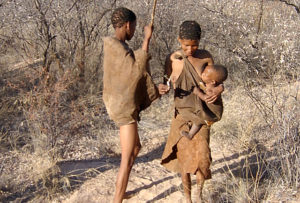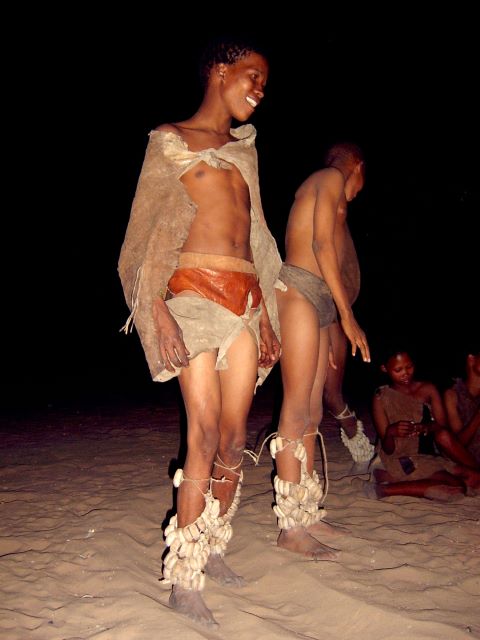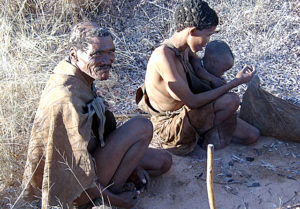The original residents of the Central Kalahari Game Reserve in Botswana joyfully welcomed a group of visitors into their villages recently, according to a blog post written by an official with the safari operator. To judge by their website, Wilderness Safaris is a well-established company that offers safari experiences for tourists in southern Africa. The interest in this particular post, dated December 29, is the potential insights it offers into the lives of the San people who inhabit the remote settlements in the CKGR, primarily the G/wi.

The writer, Rauve Vasco, describes the trip by four vehicles and one ten-ton truck over rough, arid terrain to visit the small hamlets and deliver Christmas gifts of food and articles of clothing that volunteers had collected. The residents of the villages met the arriving visitors with songs and dances. Small children and old ladies greeted them with laughter and clapping. “There was so much gratitude, and so much need, yet so much peace in the eyes of these people,” Vasco writes.
He describes in detail their visit to Mothomelo, their last stop of the trip. Alerted to their impending arrival, the entire village was waiting for them. Once the dust had settled, everyone broke into songs and dancing. The villagers welcomed the visitors with “unbridled joy” which brought tears to the eyes of the visitors. Vasco describes the process of unloading their gifts from the truck and handing them to the grateful people.

That evening as the visitors were settling into their campsite for the night, the G/wi came out of their homes again and gathered around them. Young and old told stories, danced, and clapped along with their songs. The visitors joined the villagers in their singing.
The people from Wilderness Safaris had come with the idea that they were the ones who were doing the giving but they discovered that they were given “the biggest gift of all: the gift of humanity, the gift of sharing, the gift of being allowed a glimpse into the lives of ancient people,” as Vasco put it.
The cynical reader may be tempted to assume that of course the villagers were filled with joy—they were about to get significant gifts of free food and clothing. Why wouldn’t they be happy? But the excessive pleasure the G/wi expressed when visitors arrived in their villages leads one to wonder if they are predisposed to welcoming visitors. Do the people of Mothomelo and the other communities in the CKGR have a tradition of welcoming strangers? If so, why?
Fortunately, George Silberbauer, a scholar who did fieldwork among the G/wi 50 years ago, noticed similar behavior and described his observations in a paper published in 1972. He wrote that when the word went out from one band via informal word of mouth that they had plentiful supplies and would welcome visits from other bands, in time, as this was repeated, other groups of people would come and pay them a visit.
The visitors would share in the resources just as if they were residents and the members of the two bands would mingle as if they were close friends. Those friendly visits would facilitate social interconnections, the sharing of resources, and the extension of kinship ties through fostering marriages.

Silberbauer concluded that since the territories of some bands could be stricken with drought at any given time, the sharing of resources fostered by those friendly visits helped ensure the survival of all the bands. The reciprocity inherent in the relationships between the bands and the alliances, friendships, and kinship relations that they formed helped inhibit competition for scarce resources.
In sum, the visit last week by the Wilderness Safari people provoked responses from the G/wi based on motives that developed due to the scarcity of the desert environment.